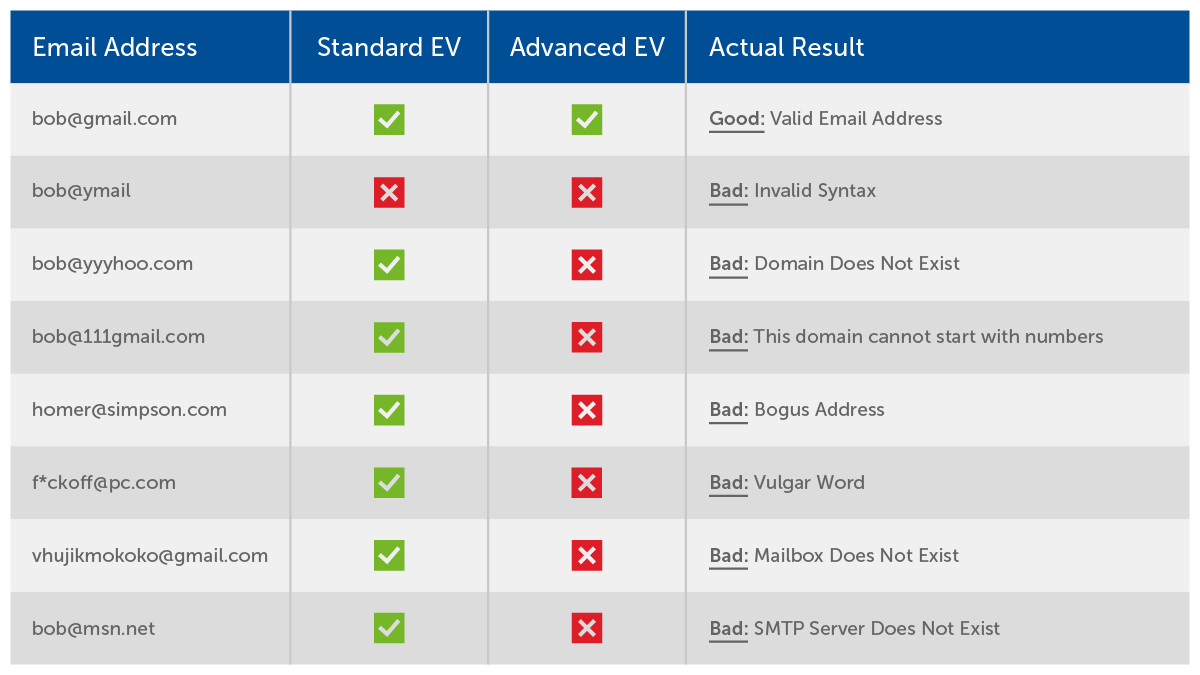- Products
- Solutions
- Developers
- Support
- About
- Login
- Blog
The primary function of any email address validator (EAV) is to weed-out bad email addresses, yet a majority of bad email addresses pass using standard Javascript email address validation scripts. Standard email address validation uses client-side Javascript to perform rudimentary tests that let a lot of bogus email addresses pass unnoticed. Not so with advanced email address validation Web services.
Standard email address validation, using basic client-side validation Javascript, only checks the syntax of an email address. It assures that an email address contains a box name, an @-symbol, a domain name and a minimum character count. Given standard email validation testing, a bogus email address like test@test.me, will pass validity testing 99.99% of the time.
An Advanced email address validation Web service offers a significantly more thorough approach. It instantly weeds-out invalid email addresses using sophisticated algorithms and dozens of rules and tests. It acts like x-ray vision for email addresses, seeing beyond basic syntax to identify shortcomings in the address that are not apparent to the naked eye.
There are six things every email validation system should do to ensure an email address is valid:
Because standard email validation only checks for syntax regularity, it will incorrectly pass email addresses that should be failed in six out of eight scenarios. See chart below.
How do they compare? Pass/Fail Rate for Standard vs. Advanced Email Address Validators (EV)

How an advanced email address validation Web service works: Like standard email address validation, an advanced Web service checks for syntax regularity; however, it surpasses standard Javascript validators and uses artificial intelligence, multiple tests, and complex algorithms to identify unlikely email addresses. It uses real-time network signaling to query a remote telnet server by sending a micro-message to verify that an email message can be sent, without actually sending a message.
Specifically, tests performed on the telnet server include: Does the telnet server exist? Does the telnet server answer? Does the telnet server answer in a timely fashion? Is it intelligent? Does it respond to basic commands? Does it have a directory of users? Does it recognize the email box for which we are testing? Will it accept mail for this address? All in all there are over 35 different tests that are performed on the telnet server in the attempt to validate an email address.
Simultaneously, email address legitimacy is tested: Does the email address contain vulgar words? Does the domain match the mail box name? Is the email address known as disposable? Essentially, is this email address bogus?
Email validation can be simple or sophisticated: Standard email validation assures that emails are correctly formatted while an advanced email validation Web service does that, plus exploits the latest Internet technology to help weed out bad, invalid and bogus email addresses at the point of entry.
Service Objects offers real-time APIs, including an advanced email validation service: DOTS Email Validation which instantly verifies and corrects email addresses, while providing a validity score from 0-4 for each email.
Want to test drive Email Validation? Start with a Free Trial Key
When you sign up for any Service Objects trial key, you receive access to the full version of the product, including 500 test transactions and access to our dedicated 24/7 customer support.
We use cookies to enhance your browsing experience.
Cookies, tracking pixels, and similar tech are small data files served by our platform and stored on your device. They help with site operation, personalization, and may track your usage for targeted ads on other sites.
By using our site, you agree to our cookie use.
Third-party services may also deploy cookies, including Google, Facebook, and others. These services collect anonymous data like IP addresses and device IDs for analytics and site functionality.